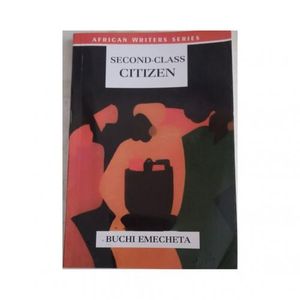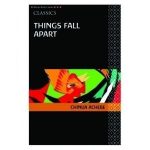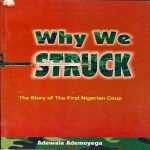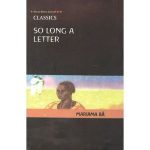
The classic tale of a Nigerian woman who overcomes strict tribal domination only to encounter the hardships of immigration. Available again.
In the late 1960’s, Adah, a spirited and resourceful woman manages to move her family to London. Seeking an independent life for herself and her children she encounters racism and hard truths about being a new citizen. “Second Class Citizen pales a lot of academic feminist writing into insignificance.” –The Guardian
“Emecheta’s prose has a shimmer of originality, of English being reinvented….Issues of survival lie inherent in her material and give her tales weight.” –John Updike
The classic tale of a Nigerian woman who overcomes strict tribal domination only to encounter the hardships of immigration. Available again.
In the late 1960’s, Adah, a spirited and resourceful woman manages to move her family to London. Seeking an independent life for herself and her children she encounters racism and hard truths about being a new citizen. “Second Class Citizen pales a lot of academic feminist writing into insignificance.” –The Guardian
“Emecheta’s prose has a shimmer of originality, of English being reinvented….Issues of survival lie inherent in her material and give her tales weight.” –John UpdikeThe classic tale of a Nigerian woman who overcomes strict tribal domination only to encounter the hardships of immigration. Available again.
In the late 1960’s, Adah, a spirited and resourceful woman manages to move her family to London. Seeking an independent life for herself and her children she encounters racism and hard truths about being a new citizen. “Second Class Citizen pales a lot of academic feminist writing into insignificance.” –The Guardian
“Emecheta’s prose has a shimmer of originality, of English being reinvented….Issues of survival lie inherent in her material and give her tales weight.” –John UpdikeThe classic tale of a Nigerian woman who overcomes strict tribal domination only to encounter the hardships of immigration. Available again.
In the late 1960’s, Adah, a spirited and resourceful woman manages to move her family to London. Seeking an independent life for herself and her children she encounters racism and hard truths about being a new citizen. “Second Class Citizen pales a lot of academic feminist writing into insignificance.” –The Guardian
“Emecheta’s prose has a shimmer of originality, of English being reinvented….Issues of survival lie inherent in her material and give her tales weight.” –John UpdikeThe classic tale of a Nigerian woman who overcomes strict tribal domination only to encounter the hardships of immigration. Available again.
In the late 1960’s, Adah, a spirited and resourceful woman manages to move her family to London. Seeking an independent life for herself and her children she encounters racism and hard truths about being a new citizen. “Second Class Citizen pales a lot of academic feminist writing into insignificance.” –The Guardian
“Emecheta’s prose has a shimmer of originality, of English being reinvented….Issues of survival lie inherent in her material and give her tales weight.” –John UpdikeThe classic tale of a Nigerian woman who overcomes strict tribal domination only to encounter the hardships of immigration. Available again.
In the late 1960’s, Adah, a spirited and resourceful woman manages to move her family to London. Seeking an independent life for herself and her children she encounters racism and hard truths about being a new citizen. “Second Class Citizen pales a lot of academic feminist writing into insignificance.” –The Guardian
“Emecheta’s prose has a shimmer of originality, of English being reinvented….Issues of survival lie inherent in her material and give her tales weight.” –John UpdikeThe classic tale of a Nigerian woman who overcomes strict tribal domination only to encounter the hardships of immigration. Available again.
In the late 1960’s, Adah, a spirited and resourceful woman manages to move her family to London. Seeking an independent life for herself and her children she encounters racism and hard truths about being a new citizen. “Second Class Citizen pales a lot of academic feminist writing into insignificance.” –The Guardian
“Emecheta’s prose has a shimmer of originality, of English being reinvented….Issues of survival lie inherent in her material and give her tales weight.” –John UpdikeThe classic tale of a Nigerian woman who overcomes strict tribal domination only to encounter the hardships of immigration. Available again.
In the late 1960’s, Adah, a spirited and resourceful woman manages to move her family to London. Seeking an independent life for herself and her children she encounters racism and hard truths about being a new citizen. “Second Class Citizen pales a lot of academic feminist writing into insignificance.” –The Guardian
“Emecheta’s prose has a shimmer of originality, of English being reinvented….Issues of survival lie inherent in her material and give her tales weight.” –John UpdikeThe classic tale of a Nigerian woman who overcomes strict tribal domination only to encounter the hardships of immigration. Available again.
In the late 1960’s, Adah, a spirited and resourceful woman manages to move her family to London. Seeking an independent life for herself and her children she encounters racism and hard truths about being a new citizen. “Second Class Citizen pales a lot of academic feminist writing into insignificance.” –The Guardian
“Emecheta’s prose has a shimmer of originality, of English being reinvented….Issues of survival lie inherent in her material and give her tales weight.” –John UpdikeThe classic tale of a Nigerian woman who overcomes strict tribal domination only to encounter the hardships of immigration. Available again.
In the late 1960’s, Adah, a spirited and resourceful woman manages to move her family to London. Seeking an independent life for herself and her children she encounters racism and hard truths about being a new citizen. “Second Class Citizen pales a lot of academic feminist writing into insignificance.” –The Guardian
“Emecheta’s prose has a shimmer of originality, of English being reinvented….Issues of survival lie inherent in her material and give her tales weight.” –John Updike















Reviews
There are no reviews yet.